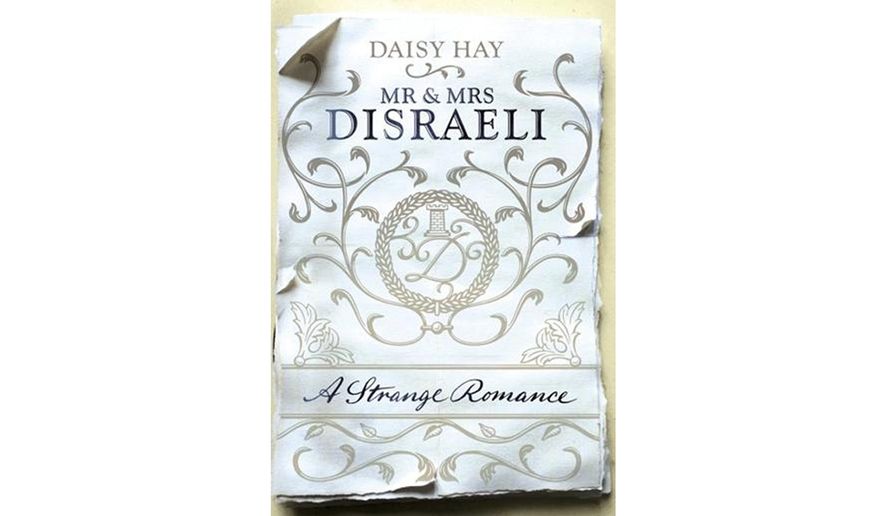OPINION:
MR. & MRS. DISRAELI: A STRANGE ROMANCE
By Daisy Hay
Farrar, Straus and Giroux, $27, 308 pages, illustrated
Benjamin and Mary Anne Disraeli were the 19th century’s premier odd couple. He was born in London into an intellectual and literary Jewish household, she in Devon, the daughter of a sailor. He was a brilliant, cynical Byronic figure engaging in a series of stormy affairs while he wrote novels and struggled to get into politics, and was perennially debt-ridden. She rose from humble beginnings through marriage to a rich, older member of Parliament who died, leaving her a widow in her 40s with a considerable fortune and position in London society. A dozen years older than he was, she was considered as silly as he was wily, her malapropisms and blunders a ridiculous contrast to his aphoristic wit. A marriage of convenience, everybody said when they wed in 1839 — he at 35, she at 47 — although during their 33 years of marriage, almost everyone realized that it had ripened into genuine affection and perhaps even true love.
But as Daisy Hay, a highly educated British academic whose previous book was the esteemed “Young Romantics,” demonstrates, the beginning at any rate was more complex: “Neither Mary Anne nor Disraeli could reconcile their conception of themselves or each other with the cynicism of a marriage of convenience, and it mattered to them both that they should be, and appear to be, swept up in a grand romance. That romance’s fictional quality gave them an emotional context for their courtship, endowing it with the drama denied them by circumstances.”
Because of her deep engagement with the Romantic period, which dominated Britain in the first decades of the 19th century, Ms. Hay is marvelously adept at showing us how both Disraelis were formed and shaped by this time, even if their historical heyday was in the High Victorian period. She is fascinating in her analysis of how they saw themselves in the mirror of the epistolary novels of Fanny Burney and the Romantic ones of Jane Austen — and of course in Benjamin Disraeli’s own works of fiction.
His prodigiousness at these — he wrote 18, all of them hefty, like those of his contemporaries Dickens and Thackeray — even during a political career that included two premierships and other high offices of state is astonishing. A striking example of Victorian industriousness even if he remained in many ways a dyed-in-the-wool Romantic. His novels reflect and in some strange way nourished both his politics and his persona; and, of course, his marriage. His last completed novel, “Endymion,” which he began in 1870 — and worked on throughout a decade in which he lost his wife to cancer (and his triumphant second premiership lasting six years) before publishing it in 1880 the year before his death — is a case in point. “Disraeli never wrote an autobiography, but in ‘Endymion’ he drew on memories awakened by Mary Anne’s papers to fashion a narrative based on his own life. ‘I did not marry for love,’ acknowledges the novel’s heroine, ‘Though love came, and I brought happiness to one who made me happy.’”
Ms. Hay has delved into heretofore unplumbed archives to provide many fresh glimpses and apercus into the Disraelis’ evolving relationship and marriage. She acknowledges that Mary Anne was a great fantasist, inventing tall tales about her origins, and that both she and her husband were adept at donning masks that covered up their true natures. Not the least of this book’s achievements is to see the importance and meaning of the masks, to wearers and viewers alike, while looking beneath them for a deeper truth. She is also good at integrating the personal into the wider social and political scene. Mary Anne’s worth is not validated only by her husband’s hardly impartial view: The heartfelt posthumous tributes paid by so many from Queen Victoria down testify to her qualities. Perhaps the strongest indication is that her husband’s great political rival, the ponderous William Gladstone, who had no time for him as a man, wrote some years before “of his sincere esteem for Mary Anne, with whom he maintained a cordial relationship even in the midst of rancorous exchanges with Disraeli.”
A classic of definition of the cynic is that he knows the price of everything and the value of nothing. Disraeli’s tenuous place in English society notwithstanding his conquest of it made him a natural lifelong cynic. In most things, he came increasingly to know worth as well as cost, but it is clear after reading “Mr. & Mrs. Disraeli” that nowhere was this as true as in his relationship with his wife. He scorned even the achievement of the highest political office, where he would rank as one of the greatest prime ministers in British history, as “climbing to the top of the greasy pole.” But there is never the slightest hint of irony or of prevarication in his mature love for his wife, nor any sign that his grief in the nine years between her death and his was anything but sincere. Ms. Hay insightfully characterizes their marriage as “surprising, eccentric, and important.” It was all that and more: a real-life love story that will move and touch the reader as much as any to be found in the novels of Jane Austen.
• Martin Rubin is a writer and critic in Pasadena, California.




Please read our comment policy before commenting.